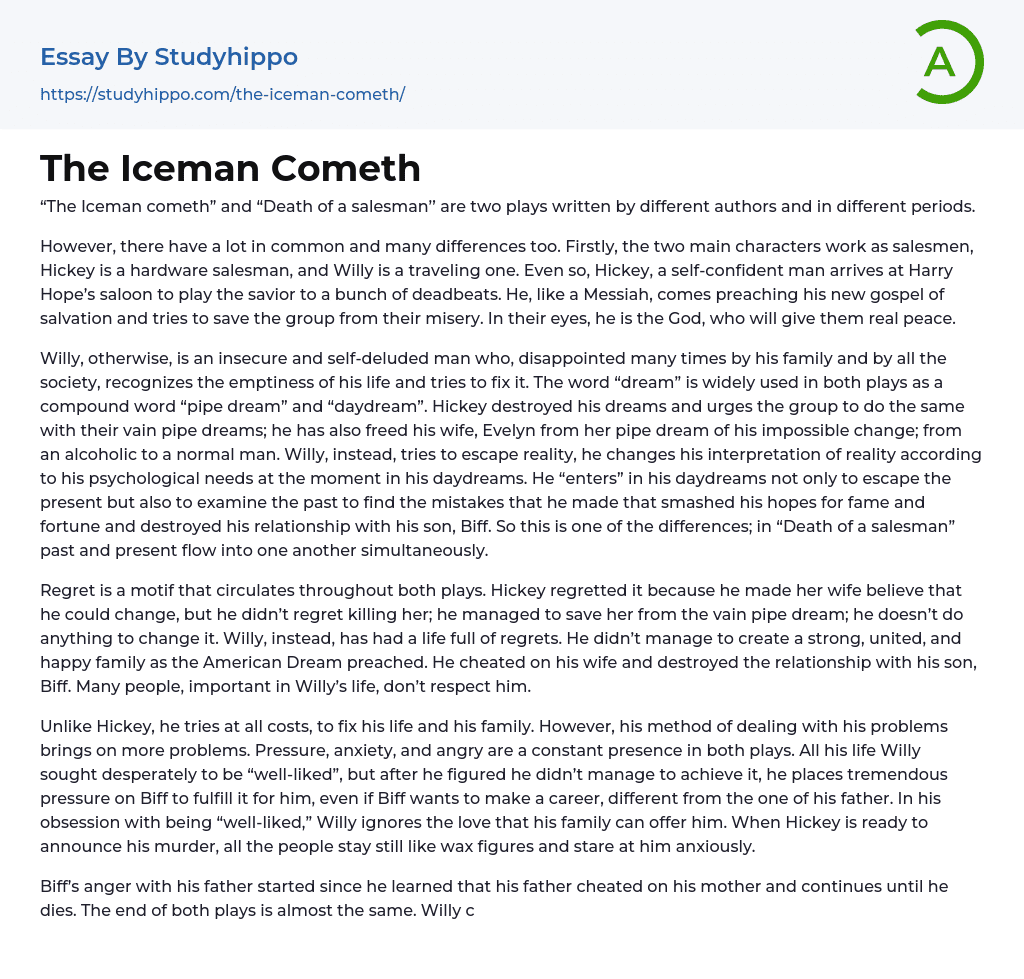“The Iceman cometh” and “Death of a salesman’’ are two plays written by different authors and in different periods.
However, there have a lot in common and many differences too. Firstly, the two main characters work as salesmen, Hickey is a hardware salesman, and Willy is a traveling one. Even so, Hickey, a self-confident man arrives at Harry Hope’s saloon to play the savior to a bunch of deadbeats. He, like a Messiah, comes preaching his new gospel of salvation and tries to save the group from their misery. In their eyes, he is the God, who will give them real peace.
Willy, otherwise, is an insecure and self-deluded man who, disappointed many times by his family and by all the society, recognizes the emptiness of his life and tries to fix it. The word “dream” is widely used
...in both plays as a compound word “pipe dream” and “daydream”. Hickey destroyed his dreams and urges the group to do the same with their vain pipe dreams; he has also freed his wife, Evelyn from her pipe dream of his impossible change; from an alcoholic to a normal man. Willy, instead, tries to escape reality, he changes his interpretation of reality according to his psychological needs at the moment in his daydreams. He “enters” in his daydreams not only to escape the present but also to examine the past to find the mistakes that he made that smashed his hopes for fame and fortune and destroyed his relationship with his son, Biff. So this is one of the differences; in “Death of a salesman” past and present flow into one another simultaneously.
Regret is a motif that circulates
throughout both plays. Hickey regretted it because he made her wife believe that he could change, but he didn’t regret killing her; he managed to save her from the vain pipe dream; he doesn’t do anything to change it. Willy, instead, has had a life full of regrets. He didn’t manage to create a strong, united, and happy family as the American Dream preached. He cheated on his wife and destroyed the relationship with his son, Biff. Many people, important in Willy’s life, don’t respect him.
Unlike Hickey, he tries at all costs, to fix his life and his family. However, his method of dealing with his problems brings on more problems. Pressure, anxiety, and angry are a constant presence in both plays. All his life Willy sought desperately to be “well-liked”, but after he figured he didn’t manage to achieve it, he places tremendous pressure on Biff to fulfill it for him, even if Biff wants to make a career, different from the one of his father. In his obsession with being “well-liked,” Willy ignores the love that his family can offer him. When Hickey is ready to announce his murder, all the people stay still like wax figures and stare at him anxiously.
Biff’s anger with his father started since he learned that his father cheated on his mother and continues until he dies. The end of both plays is almost the same. Willy commits suicide as he leaves behind a life full of regrets and mistakes. Hickey is taken to jail for killing his wife and he prays for the electric chair.
Before closing, a soft melody is heard. It represents some pieces of their
past life, conducting a very valuable message. Florida Totojani
- Child essays
- Childcare essays
- Child labor essays
- Doll essays
- Nightclub essays
- Adoption essays
- Aunt essays
- Babies essays
- Bedroom essays
- Caring essays
- Children essays
- Daughter essays
- Divorce essays
- Dog essays
- Dysfunctional Family essays
- Family Tradition essays
- Family Values essays
- Father essays
- Foster Care essays
- Friends essays
- Grandparent essays
- Home essays
- Hometown essays
- Husband essays
- Jealousy essays
- Love essays
- Marriage essays
- Mother essays
- Online Dating essays
- Parenting essays
- Parenting Teens essays
- Parents essays
- Relationship essays
- Room essays
- Sibling essays
- Sister essays
- Wedding essays
- Wife essays
- A Doll's House essays
- A Midsummer Night's Dream essays
- A raisin in the sun essays
- A Streetcar Named Desire essays
- An Inspector Calls essays
- Death of a salesman essays
- Everyman essays
- Fences essays
- Hamlet essays
- Hedda Gabler essays
- Iago essays
- King Lear essays




